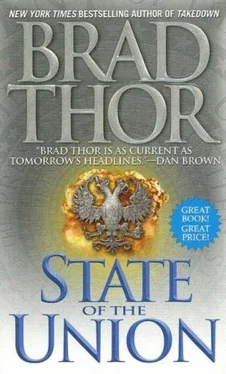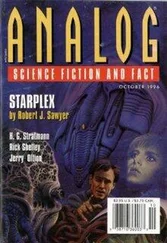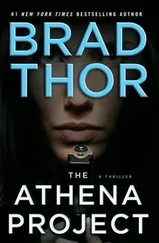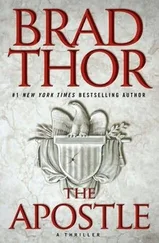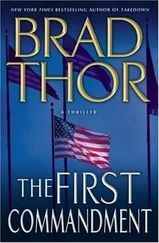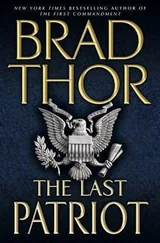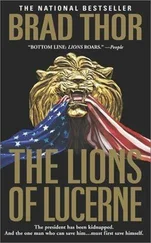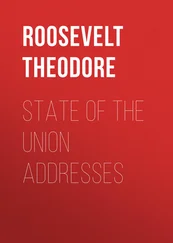Minutes later, the fog of gun smoke still hung thick in the air. Alexandra Ivanova had no idea if the ringing in her ears was from her own screaming over the loss of General Anatoly Karganov, or from the deafening roar of the Pit Bull as its.45-caliber armor-piercing rounds raced out of the barrel and tore through the flesh of the onetime orphan from Nizhnevartovsk, and now lifeless Moscow crime figure, Milesch Popov.
THE WHITE HOUSE
STATE OF THE UNION ADDRESS-6 DAYS
What I’m asking for, Mr. President is your guarantee, right now, as a member of NATO and the elected leader of the Republic of France, to stand by us on this one,” replied President Rutledge, who then fell quiet as he listened to his counterpart’s response.
Several moments passed, during which the American president couldn’t help rolling his eyes. He couldn’t believe what he was hearing. When it was his turn again to speak, Rutledge had to fight to keep his temper in check. “No, this isn’t anAmerican problem, it’s aninternational problem and no, we are not interested in having you mediate it for us. There’s nothing to mediate. The sovereignty of the United States is not negotiable.
“Benoit, all countries committed to freedom and peace must take a stand in the war on terror, no matter where that terror comes from. Like it or not, the bloodlines of our two nations are forever intertwined. French blood was spilled in helping to forge our nation and create our sovereignty, and American blood has been spilled in not one, but two great wars in helping your countrymen preserve yours. I can’t state more strongly that we believe-”
Interrupted by a retort from the French president, Rutledge again fell silent for several moments before responding, “Benoit, I want you listen to me and listen good. You’ve been waffling ever since we sent you the file on this from Langley. I know you have problems within your own political party right now and I’ve also got a good idea of what the current disposition is across the European Union toward the United States, but I want to make it completely clear that America resents the fact that you are even weighing what your position should be on-”
Rutledge gripped the phone so tightly he was sure he was going crack the receiver as he was interrupted yet again. Finally, he lost it and the diplomacy with which he was trying to conduct their conversation evaporated. “I don’t give a good goddamn what parallels you think you see between this situation and what happened with Iraq. I’m not going down that road. If your intelligence people want to see the bomb we have in our possession, they’re welcome to it. In fact, they should, just in case you end up with one in your backyard. The reason the Brits got the first look was because MI6 already had operatives over here doing a cross-training exercise with some of our people.
“Benoit, I have a lot of phone calls yet to make, so I’m going to save us both some time and cut right to the chase. We agree with you one hundred percent that by all acceptable standards, the intelligence we have thus far is not independently actionable. But when you connect the dots in that file we sent you, they form a very scary picture. You don’t need to be a lifelong analyst to see that. Millions of people in America could die. Entire cities could be reduced to nothing more than piles of radioactive rubble. If the situation were reversed and we were talking about you potentially losing Paris, Marseilles, Lyon, and maybe even twenty more cities, what would you want to be hearing from your allies?”
Moments later, and for the first time since the situation had broken, president Jack Rutledge allowed himself to relax. “Thank you, Benoit. I’m glad we can count on you,” he said as he hung up the phone.
The feeling of relaxation, though, quickly dissipated as Rutledge’s chief of staff, Charles Anderson, who had been simultaneously reviewing the top secret folder containing the nuclear evacuation plan for the president and his daughter, hung up the extension he’d been listening in on and said, “Well done. Only twenty-three more calls to go.”
Harvath and Herman drove through the Schöneberg district once again, though Herman made sure to steer well clear of all of the police activity near the Goltzstrasse. They passed the Rathaus Schöneberg, which Harvath recognized as the site of Kennedy’s famousIch bin ein Berliner speech, and when they finally reached Mansteinstrasse, they turned left and found a parking space. The minute Harvath laid his eyes on the Leydicke Pub at number 4 Mansteinstrasse, he knew why Gary Lawlor had chosen it.
It was in a relatively quiet neighborhood with easy access to public transportation. Though it might attract some tourists, by and large its clientele was going to be regulars, which made picking out anyone who didn’t belong there a lot easier. The pub was close enough to the safe house to be easy to get to, yet far enough away so that when coming or going, you had plenty of time to make sure you weren’t being followed. Scot saw a sign outside proclaiming that the bar had been operated by the Leydicke family for over one hundred years. If Gary Lawlor and Frank Leighton had patronized this bar often enough to get their own steins, chances were very good that somebody in the family was going to remember them. Harvath’s real hope was that one of those memories would be a recent one.
The Leydicke was a traditional German drinking establishment, known as aKneipe, with lots of carved wood and heavy oak tables. There was a distillery on the premises, and in addition to a wide variety of beers, the Leydicke offered a superb selection of sweet wines and liquors. They looked to be the only people in the place and easily found an empty table. As they sat down in the semi darkness of the dimly lit bar, it felt like they had stepped back in time. For ambiance alone, Harvath would have given it five stars, but he wasn’t writing a review, he was here for information.
When a waitress failed to arrive and take their order, Herman suggested they go up to the bar.
“Ich möchte gerne zwei Bier, bitte,” said Scot when they got there.
“Big or small?” responded the barman in English, picking up on Harvath’s American accent and the fact that he asked so politely, unlike a local who would have simply said, “zwei Bier, bitte.” The man was short, about five foot four with a large stomach that hung over his white apron. His wire rimmed glasses rested upon a rather bulbous nose, which stood guard over a thick and unkempt mustache. He was easily in his late sixties, if not older, and balding.
“Big, I guess,” replied Harvath.
“We’re closing, so you get small,” said the barman.
“So much for German hospitality,” responded Harvath under his breath. Herman just rolled his eyes.
When the bartender placed their small beers in front of them, Scot withdrew a picture taken of him along with Gary Lawlor at one of Gary’s summer barbeques and handed it across the bar. “Look familiar?”
Before the man could say anything, Harvath caught the slightest hint of recognition on the man’s face, which he quickly masked.
“Nein,” he said, handing the photo back.
“You’ve never seen the man standing next to me in that photo?” asked Harvath.
“Nein.”
There it was again. The tell. Most people would have missed it, but his Secret Service training to detect what scientists referred to as microexpressions, the subtle and almost imperceptible facial cues that subjects unknowingly give off when they are not telling the truth, made it clear to Harvath that the man was lying.
“Maybe we could talk to one of the managers?”
“There is no manager here.”
Читать дальше
